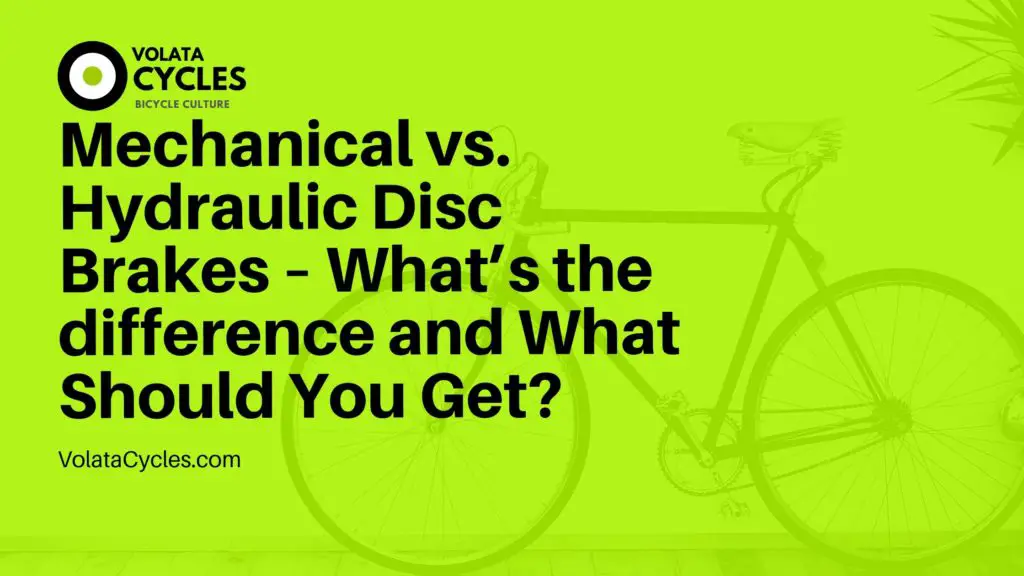Are you curious about these two types of disc brakes and wondering which of them you should be getting?
Of course, you are; that’s why you’re here. Well, you’ve come to the right place; we’re here to break it down for you by talking about the differences, advantages, and disadvantages of each.

After analyzing both systems, what we can be certain of is that there isn’t one answer to the question of which is better, because it will all depend on your biking needs, preferences, and of course, budget.
Basically, a mechanical braking system operates the same way a hydraulic one does; both systems activate pads, squeezing them against the discs of a bike to make it stop or slow down. The main difference is in the way each system activates those pads.
Mechanical Vs Hydraulic disc brakes: Pros and Cons
The mechanical vs hydraulic disc brakes debate has been going on for years, with both sides claiming they offer the best performance and reliability. But what are the real differences between mechanical and hydraulic disc brakes?
Brake Efficiency
A mechanical braking system uses cables to activate the brake pads, while a hydraulic braking system uses fluid to do the same. And because these two systems use different methods to send a force from the lever to the brake pads, the efficiency with which that force is transmitted can vary.
The cable implementation used on a mechanical system, for instance, requires the force used to squeeze the lever to be greater than the force transmitted to the calipers. While in a hydraulic system, which uses fluid to transmit power from lever to caliper, the opposite is true.
This means that a hydraulic braking system requires less effort to stop a bike, as well as offers more braking power than a mechanical one.
Maintenance
Requiring less effort to stop a bike and offering more braking power, however, is not all that matters–at least for some people.
Because a hydraulic braking system is fully enclosed (it’s a fluid-filled system, after all), this means it is close to impossible to fix on the fly. If anything in the system breaks while you’re in the middle of a bike trail, then you can expect to be carrying that bike all the way back.
Whereas if you find yourself in the same situation with a bike that uses a mechanical braking system, then it won’t be difficult to have it fixed in a jiffy (granted you’re sufficiently competent about such things).
In either case, a mechanical bike is infinitely easier to fix on the fly, which might be a fact worth considering when deciding which system to use. Also, given the fact that a hydraulic system is more complex than a mechanical one, it is thus more expensive to maintain.
So, in a nutshell, as far as maintenance is concerned, mechanical systems are both easier and cheaper to maintain.
But there are also upsides to the closed design of a hydraulic braking system, and they may very well offset the downsides mentioned above depending on one’s needs and preferences.
For one, the closed design of a hydraulic system makes it more impervious to the buildup of gunk inside the system. Because of a hydraulic system’s closed design, dirt and grime don’t get into the system as easily as they do on a mechanical one, which means maintenance won’t be needed as frequently.
Indeed, one of the biggest advantages of a hydraulic braking system over a mechanical one is that it requires much less maintenance.
If you’re the type who frequently wades their bike through muck and mud, then you’re safer with a hydraulic braking system, which won’t clog up as easily as a mechanical one.
Comfort and Feel
Anyone who’s tried both systems will testify to the fact that a hydraulic system simply feels better.
It requires less force from the lever to stop the bike, and modulation of the bike’s speed is a much smoother experience. Those two advantages alone assure a more comfortable and confident biking experience.
But there’s another reason why a hydraulic braking system feels better than a mechanical one, and it is because the latter system is typically less heavy than the former, which means the latter will also require less effort to ride, especially on steep hill-climbs.
Price
The most obvious downside to a hydraulic system is its price. It’s more expensive than mechanical systems, but why? Well, because of the complexity of their design and the components they are made of.
Hydraulic braking systems require larger pistons and seals, along with piston bushings that can resist high pressure created by fluid flowing through them.
But if you’re willing to shell out the extra dough, then it could be worth it in exchange for a smoother and more consistent braking performance.
Installation
Keep in mind that installing hydraulic brakes can be a difficult task, often requiring specialized skills and equipment. Alternatively, mechanical systems are significantly easier to set up as they usually just require regular tools.
So if you’re not particularly tech-savvy or don’t have a lot of mechanical experience, then it’s better to opt for mechanical brakes, especially if you’re on a budget.
Which One Should You Get?
If you need a good bike and have enough budget to get one that uses a hydraulic braking system, then, by all means, do so. In fact, it is what we’d recommend.
A hydraulic braking system simply beats a mechanical one in almost all respects. From braking efficiency to overall comfort and confidence, you can’t go wrong opting for a bike using a hydraulic braking system if you can afford it.
But if your budget is limited, are fine living with the disadvantages of a mechanical system, and would rather have a bike that is both cheap and easy to maintain, then go for a bike with a mechanical braking system.
There are many good ones out there. Indeed, there have been many advancements in mechanical braking systems that one who isn’t an absolute stickler for performance can’t go wrong opting for it, either.
At the end of the day, it’s a personal choice that should be based on your preferences as a bike owner and your budget. Weigh in the pros and cons carefully and make an informed decision!
Frequently Asked Questions
Do I really need hydraulic disc brakes?
Not necessarily. If you plan on sticking to regular trails and don’t mind mechanical systems, then no, you don’t need hydraulic brakes. That said, if you’re an enthusiast or a professional cyclist who wants the best performance out of their bike, then yes, it might be worth investing in a set of hydraulic brakes.
Are mechanical disc brakes good enough?
Yes. Mechanical disc brakes have come a long way since their introduction and can offer reliable performance, depending on the terrain you ride in. But if you want the best performance possible, then a hydraulic system will be a better option.
Can I upgrade from mechanical to hydraulic disc brakes?
Yes, you can. However, this is not a mechanical task and should be done by a professional bike mechanic.
How often should I maintain my hydraulic disc brakes?
To guarantee your brake system is functioning optimally, it’s suggested to bleed the brake fluid every 1-2 years or as needed, and examine the pads for wear at least every 3 months.
Additionally, you must keep the rotors and calipers clean for optimal performance.
Do I really need 4 piston brakes?
No, you don’t need 4-piston brakes. It all depends on your riding style and the type of terrain you ride in. Generally speaking, two-piston brakes should suffice for most riders. But if you do a lot of downhill or endurance racing then more pistons might be beneficial to you.
How long do hydraulic disc brakes last?
Depending on the environment, your stopping habits, pad type, and riding style or terrain, the mileage you can get from a resin and sintered metal pad will vary. However with proper care and use of these pads generally yields 500-700 miles for resin pads and 1000-1250 miles for sintered metal pads.
How reliable are hydraulic disc brakes?
Hydraulic brakes are very reliable as long as they are properly maintained, inspected and serviced. This includes proper bleeding of the brakes, checking pad wear and ensuring that the brake components don’t have any mechanical issues.
Final Words
At the end of the day, mechanical vs. hydraulic disc brakes are a personal choice that should be based on your riding style, preferences and budget. So make sure to carefully weigh in all pros and cons before making a decision. But either way, we’re sure you won’t be disappointed with your new ride!
